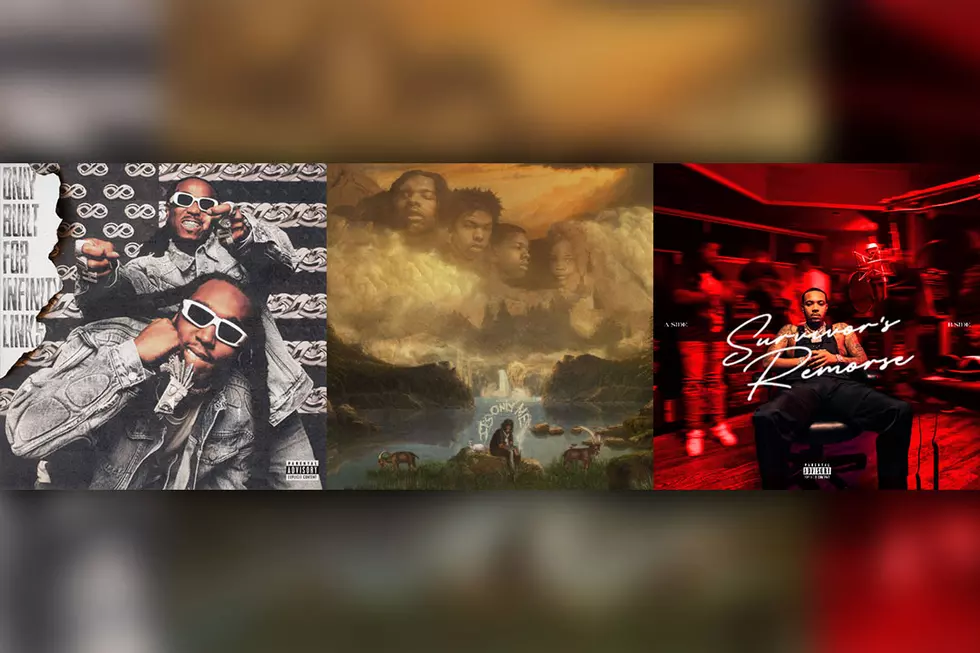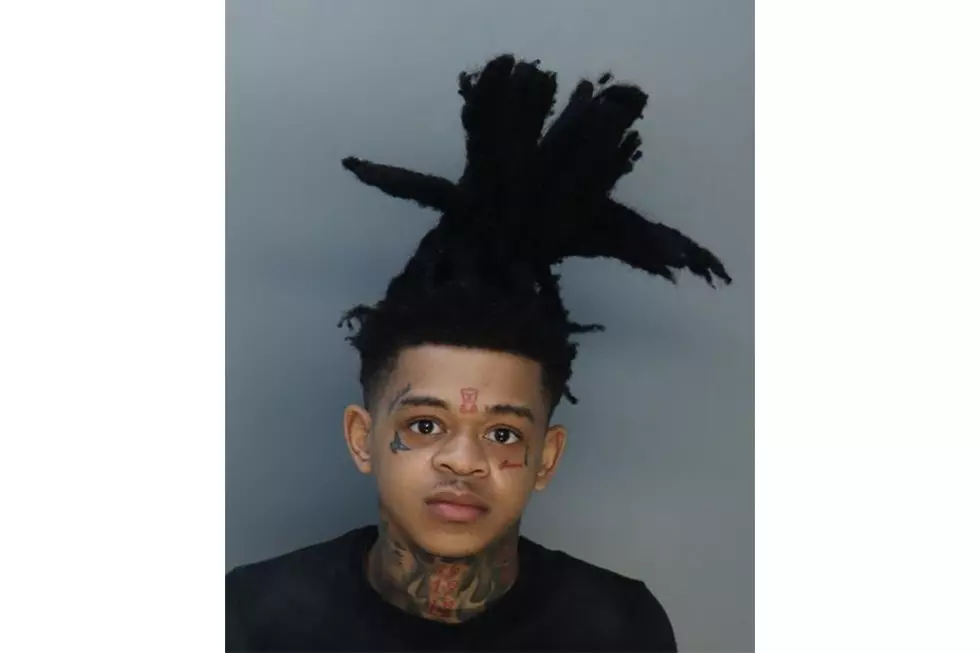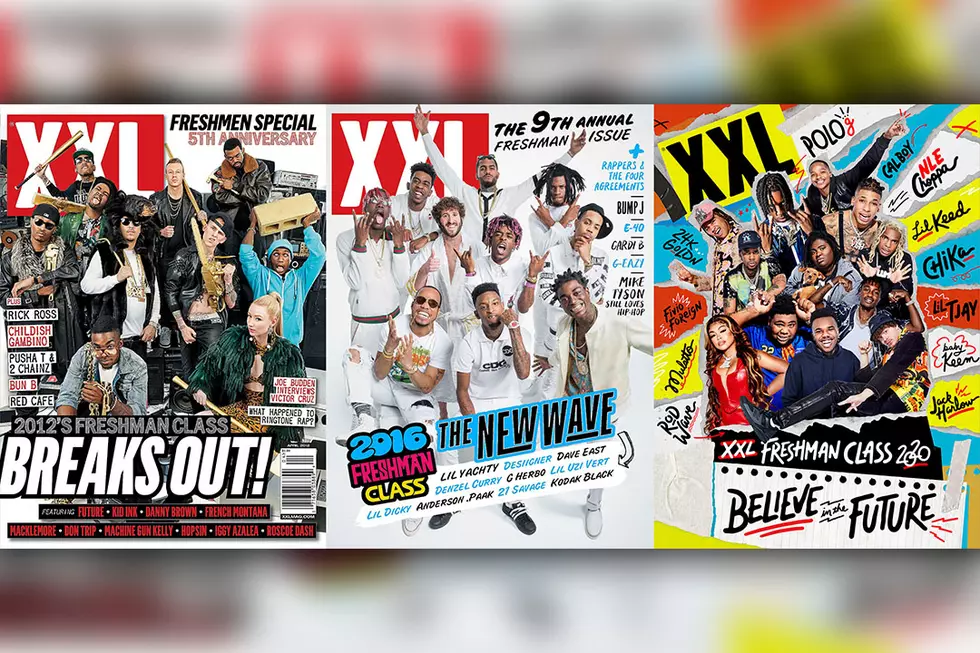
Explore the History of the Hip-Hop Remix and What It Really Means Today
One More Chance
SpotemGottem’s trap banger “BeatBox” inspired countless rappers to hop on the hard-hitting beat and drop their own version of the song last year. But what does a remix really mean these days? Explore this essential element of hip-hop culture.
Words: Rob Kenner
Editor’s Note: This story originally appeared in the Winter 2021 issue of XXL Magazine, on stands now.
“Know we had to do a remix, right?”
—Puff Daddy on Craig Mack’s “Flava In Ya Ear (Remix)” in 1994
https://www.youtube.com/watch?v=PMbELEUfmIA
SpotemGottem knew his breakthrough hit “BeatBox” was outta here before he even came up with a name for the song. The Jacksonville, Fla. rapper was 19 at the time, locked up in the studio night and day “tryin’ to get a hit.” Over Damn E’s rumbling 808s and ominous shards of melody, Spotem spit two minutes worth of cathartic bars about “thuggin’ in my Reeboks, riding with a G-Shock,” and elaborating on everything his draco can do in vivid detail. “Bitch, I got no sense,” he warned.
“It was just the sound,” he told XXL last May. “The song was too catchy. It was a lot of key punch-ins on that bi… So, I already knew… Everybody like, ‘This one right here!’” And when Spotem says everybody, he means it.
Revisiting a hot instrumental is a time-honored tradition in hip-hop. Remember all those versions of Lil Wayne’s “A Milli” and M.I.A.’s “Paper Planes”? Certain beats are just too hard to resist. “BeatBox” wasn’t 2021’s only viral rap phenomenon. Coi Leray’s “No More Parties” inspired flips by K Camp, Lil Yachty and Polo G while Pooh Shiesty’s “Back in Blood” featuring Lil Durk was repurposed by the likes of Kevin Gates, Toosii and 22Gz. But “BeatBox” is 2021’s undisputed remix champ, inciting memorable verses by a gang of established rappers like Yachty, DaBaby and NLE Choppa, and hungry up-and-comers such as Canada’s Dax and TEC from New Orleans. They’re all determined to catch the wave and show and prove their skills. Just don’t ask Spotem to pick a favorite. “It’s too many of ’em bitches, though,” he said with a laugh.
https://www.youtube.com/watch?v=fa8RHstfrI4
https://www.youtube.com/watch?v=0-Tm65i96TY
https://youtu.be/my2ZvqmPaco
Despite legal issues, which include an arrest last July for aggravated assault with a firearm charge, and being hospitalized after he was shot multiple times while riding in a vehicle last September, Spotem is still riding on the success of “BeatBox,” which has more than 172 million combined Spotify streams for seven of its remixes. It all started on April 20, 2020, when he uploaded the original music video for “BeatBox,” in which Spotem frees himself from a straitjacket, shaking his trademark wick locs while waving pistols and stacks of cash. Eight months later came the first official remix, “BeatBox 2,” essentially the same song with a new verse from Pooh Shiesty. The two clips have since racked up nearly 95 million YouTube views between them.
https://youtu.be/94zTrkr5_xY
Soon after “BeatBox 2,” the song went crazy on TikTok thanks to the #JunebugChallenge. Suddenly everybody from Saweetie to LeBron James was doing a funny arm-waving dance to the track—on top of parked cars, residential rooftops, even superimposed on the Great Pyramid. Spotem’s debut mixtape, Final Destination, was already out when DaBaby dropped his remix of “BeatBox” in February of 2021. The track, which finds him name-dropping YouTube sensation Jojo Siwa, turned into the official remix known as “BeatBox 3.”
https://youtu.be/_kshP-8c690
By the time NLE Choppa released his take on the song in April, which also became the official “BeatBox 4,” Spotem was losing count of all the different versions. Polo G, who lays claim to “BeatBox 5,” Latto, Lil Yachty, Dreezy, DDG and even Young M.A—who set off a remix wave of her own back in 2017, when 50 Cent, Nicki Minaj, French Montana and A$AP Ferg all recorded their own takes on her hit “Ooouuu”—have made their own versions of Spotem’s viral smash.
https://youtu.be/5V6kqd-jWKg
Rappers are irresistibly drawn to a dope beat like moths to a flame. The question of who can spit the illest rhyme is integral to the competitive spirit of the MC’s art form. “Everybody gotta ride the hottest beat to get the hottest record,” Busta Rhymes told XXL last September. He traces the phenomenon back to Jamaican sound systems and early Bronx park jams. “And it has its waves. That’s why a million niggas rhymed over ‘Love Is the Message.’ A million niggas rhymed over ‘Impeach the President.’ A million niggas rhymed over ‘Good Times.’”
When those rhymes get released, they’re often referred to as remixes—or alternatively, flips or freestyles. The terminology changes over time and depends on who you ask. Still, it’s safe to say that not all “remixes” are created equal. The term can be used to describe a wide range of musical and lyrical creations. You might even say that the concept of a remix itself has been remixed over the years.
For SpotemGottem’s generation, the word “remix” means something totally different than it does to, say, Busta Rhymes, whose Neptunes-produced remix of “Pass The Courvoisier Part II” turned out to be a completely different song than the original. What had been a decent cut from Busta’s 2001 album, Genesis, was reimagined and elevated to become a pop smash hit featuring Pharrell and P. Diddy.
https://youtu.be/o4ZUaxyPoZ8
Spotem, 20, wasn’t even a year old when P. Diddy and Bad Boy Records released their compilation album, We Invented the Remix. Spotem says he grew up listening to the likes of Master P and Hot Boys. “I used to watch my uncles and them freestyling in the garage and shit,” he recalled of his early inspirations. “They used to have little females and shit. I had to be 9 turning 10.” The first rap remix he remembers was “Wipe Me Down” from Pimp C’s Trill Entertainment.
You could say that Pimp C was taking a page out of the Bad Boy playbook with “Wipe Me Down,” using the remix of a song by Foxx to help launch the careers of Boosie BadAzz (then-known as Lil Boosie) and Webbie in 2006. Puffy used that same technique with the “Flava In Ya Ear (Remix)” in 1994, reworking Craig Mack’s hit single to boost an up-and-coming boom bap behemoth named The Notorious B.I.G., who would soon go on to eclipse his labelmate. Puffy had been trying to break Biggie since 1993, when he featured the Brooklyn MC on Mary J. Blige’s game-changing What’s the 411? Remix album. But just to keep it 100, Puffy did not invent the remix.
https://youtu.be/a1B2oO6D1ps
“There’s not a problem that I can’t fix, ’cause I can do it in the mix”
—Michael Cleveland on Indeep’s “Last Night a DJ Saved My Life” in 1982
https://youtu.be/GtfZbj4J71A
The art of the remix was born on the wheels of steel. Inextricably woven into the fabric of hip-hop culture, it’s embedded in the DNA of the breaks and grooves that DJ Kool Herc began playing in the rec room of 1520 Sedgwick Ave., and blasting forth from his oversized speakers at select park jams throughout the Bronx.
By isolating the best parts of his favorite records, Herc was able to stretch time as he played the breaks and grooves to create a new kind of sonic experience for the party people in the place to be. “I wonder what would happen if I put everybody together?” Kool Herc said during a panel discussion last May. “The best of it. And I called it the ‘Merry Go Round’ and that was it.” The exact sequence of records remains a closely guarded secret, but Incredible Bongo Band’s “Apache,” featured on their 1973 album, Bongo Rock, would usually kick things off, and then the breaks kept coming. “Everybody wait for that part of the party,” Herc continued. “We’re in the Merry Go Round now!” the B-boys and B-girls would tell themselves as they busted out their best moves. “You never heard it like this before,” Herc added. “And you’re back for more and more.”
The sonic experimentation continued with DJs like Grandmaster Flash, Grand Wizard Theodore and other turntable technicians who refined their craft, finding ways to loop and extend the breaks, spawning techniques like the cut, the rub, the scratch, the scribble and on and on. The action would be preserved on mixtapes, which were actual cassette tapes, as opposed to CDs, digital downloads or streaming links. The creation of the “blend tape” eventually became an art form in itself, rather than a document of a live performance. (Not to be confused with homemade pause tapes recorded from the radio.) Masters of the blend included DJ Hot Day from Queens, and Ron G from Harlem. Kid Capri used to sell his tapes at a store called Rock and Will on 125th Street in New York City. Certain blends achieved legendary status, like Capri’s combination of Stephanie Mills’ “Something in the Way (You Make Me Feel)” with the beat from The Honey Drippers’ “Impeach The President.”
“I’m from the mixtape era,” Harlem’s own DJ Ted Smooth, also known as “The Remix King”—a title bestowed upon him by Diddy—told XXL last May. “We wasn’t calling ’em remixes at the time,” he recalls. “They were just blends, and usually a mixtape started with a blend or an intro. There were so many mixtapes to buy. You only had 30 seconds to kinda sell your tape.” This was long before laptops and Serato made beat-matching a no-brainer. It was all about skills and feeling, with no mistakes allowed. “It was real vinyl,” Smooth recalls. “You literally heard the crackle… [And if] you fucked up, you had to start it over from the top. You wanted to just get it where it’s perfect.”
As mixtape culture gave way to creating 12-inch remixes for commercial release, turntable skills became optional. The British duo Coldcut used dozens of tape loops to create their famous “Seven Minutes of Madness (Remix),” which propelled Eric B & Rakim’s “Paid in Full” onto the dance charts in 1987. Among the 25 different records combined on the multilayered track was a hypnotic sample of Israeli vocalist Ofra Haza and guest scratches courtesy of U.K. turntablist DJ Cell.
https://youtu.be/IX9FXinBkbg
But in the birthplace of hip-hop, production and DJing still went hand in hand. When Pete Rock got the chance to remix Public Enemy’s “Shut Em Down,” he went so far as to add his own verse. “That Pete Rock remix was big,” master producer and remixer Salaam Remi told XXL last May. “Pete had the audacity to do ad-libs and then rhyme on a Public Enemy record… People done it on R&B records… But not on a hip-hop icon’s record. [Like], ‘Hey, we gonna add a verse on here.’ Who told you you could do that?”
Pete Rock would go on to become one of the architects of Nas’ classic 1994 debut album, Illmatic—along with Q-Tip, L.E.S., Large Professor and DJ Premier—all of whom were equally adept on the turntables and the drum machine. There was a spirit of good-natured competition amongst the close knit group of New York producers. “I was a bit worried about the competition,” admitted Rock, the self-described “Chocolate Boy Wonder,” in a 2016 Doggie Diamonds interview. “I felt like I had to put my best foot forward, and I was able to do so with the beat that Nas picked in my basement. When he heard it, he just kinda froze.” The result was “The World Is Yours,” one of the album’s standouts. Q-Tip couldn’t stop himself from making a remix of the song, flipping a Les McCann sample in an attempt to one-up Pete Rock’s use of The Ahmad Jamal Trio on the original “The World Is Yours.” He even convinced Nas to lay down a new vocal take.
https://open.spotify.com/album/3kEtdS2pH6hKcMU9Wioob1?si=JRYUZvsATn2POy0Vm5mNFA
“I felt some type of way ’cause I didn’t do it,” Pete Rock admits. Similarly, Large Professor could not contain his creative urges when it came to Nas’ “It Ain’t Hard to Tell.” After producing the original with a Michael Jackson sample, Large Professor remixed his own track combining an obscure 1970’s funk joint with a Biz Markie vocal sample. “The remix, that’s a different thing right there,” Large Pro said in a 2018 Mass Appeal interview. “’Cause of course you could make a joint out of Michael Jackson. But it’s like, ‘Aight, now we gonna pull you down to the hood and get real like buckwild on ’em.’ Don’t ever forget that we can loop some obscure thing up and just rock ’em!” The thrill of searching for unknown samples was a hallmark of New York production in the 1990s. “We started gettin’ real ill with the diggin’ and findin’ stuff that people weren’t hip to,” says Pete Rock. “That’s what got us high, findin’ stuff that people don’t know about.”
Meanwhile in Houston, DJ Screw was taking the art of the remix in a whole different direction, slowing well-known records down to create a regional style that came to be known as “chopped & screwed” and remains influential to this day. Around the same time Screw was developing his unique sound, Salaam Remi was making a name for himself by remixing Jamaican dancehall records over hip-hop and soul blends, opening up songs like Super Cat’s “Ghetto Red Hot” and Mega Banton’s “Soundboy Killing” to new listeners. In late 1993, he got a call from Jeff Burroughs, a Columbia Records exec who worked with a trio from New Jersey called the Fugees. “’Hey, could you come look at this group I have?’” Remi recalls Burroughs asking him, adding that two of the artists were Haitian. Remi knew the Fugees’ managers, so he decided to give it a shot.
Salaam Remi was asked to remix the song “Nappy Heads,” a single from the group’s 1994 album, Blunted on Reality, which wasn’t doing well. “Jeff Burroughs’ thing was that they had talent, but they needed that reggae joint,” Remi recalls. “I got in the studio with them and we made a new record. I tried to unlock each one of their potential in a different way.” Remi had Wyclef rhyme for 13 minutes and picked out the parts he thought would fit together. “A cheeba cheeba, y’all, I’m a Libra, y’all,” Wyclef said over muted horns as the snare popped at the top of the finished remix.
Having paid his dues working with Chuck Chillout and Funkmaster Flex, Remi knew that DJs would have fun cutting that intro back and forth. The remix changed perceptions of the group, and the success of the “Nappy Heads (Remix)” allowed the Fugees to make another album in 1996, which turned out to be The Score, one of the most respected hip-hop albums of all time.
Fugees’ hits like “Fu-Gee-La” were produced by Remi and he went on to work with Wyclef and Lauryn as solo stars. Some say that his remix saved The Fugees’ career, but Remi prefers to put it another way. “I guess in the course of events, that’s the way it would appear,” he demurs. “Me being who I am, I don’t necessarily put it on me. Just say that I happened to be in the place to help a group with generational talent. You know, what Wyclef and Lauryn Hill brought—and then the Fugees overall—between The Score and what they did separately, they gave birth to options that made Akon, T-Pain, Will.i.am possible… So, I just thought my position in my career overall was to help many artists find their way and find their voice.” And that process started with the right remix—a much deserved do-over. A musical second chance.
https://youtu.be/Eg2mF0gKtYw
“I think, in general, the remix is a great thing because it gave us a chance to reshape things that have happened already,” says Remi. “Repurpose these songs and get them straight. And when I’m in the situation where you can now recreate whatever you want to do, get into a great space with it. There’s nothing like being able to say, ‘Hey, this song is here, but now I’m really gonna open it up to a brand new energy.’”
Such free-wheeling creativity became harder to maintain with the rise of Broadcast Data Systems, a service that monitors the number of times musical compositions were played on radio, TV and the internet. In this age of automation, changing the beat became too much of a headache and nobody was willing to risk the potential loss of income.
“When it became the BDS era, people always wanted to keep the same track,” Remi explains. Instead of reimagining a song, the remix became a way to add new voices to an existing song. “And then add another thing on top of it because that meant that they were able to move forward and get more spins for the song with different stuff. So, I think, in general, the remix and the art of remixing is really like rearranging at this point. You can take it and bring something else out of a song that you didn’t think was possible and step it forward and get a lot of different things to happen. And I’m really excited for what that can be. And what it’s meant over the years was just bein’ able to reapproach a song and get a brand new version out of it.”
The internet has kept new creative possibilities alive. DJ Drama’s Gangsta Grillz mixtape series kicked off in 2001 with hand to hand CDs and achieved worldwide reach thanks to mixtape sites like Dat Piff. Danger Mouse did a mashup of Jay-Z and The Beatles on The Grey Album in 2008. “9th Wonder takin’ a lot of work I did on God’s Son and then making God’s Step Son to get his name out there,” Remi says. “So, the remix is an opportunity for people to step things forward.”
Some artists are not such big fans of the remix. Trinidad James, for instance, didn’t really want to do the “All Gold Everything (Remix)” featuring T.I., 2 Chainz and Jeezy in 2013. “Everybody else around me wanted to do a remix because they wanted to make money,” Trinidad said on an episode of N.O.R.E. and DJ EFN’s Drink Champs podcast last May. Although James considered himself a fan of all three artists, and respected them all highly, he wasn’t crazy about the idea of them jumping on his record. “This is my journey. This is not their journey. And they made it their journey.”
https://www.youtube.com/watch?v=sVBQYaAWJOc
For seasoned DJs like Ted Smooth, his journey has brought him to a point where “The Remix King” no longer recognizes what the industry classifies as a remix. “The way I define a remix is very different than I guess the general public, or even the veteran artists define it,” he says. “A remix to me is you take the a cappella and you remix the music, right? To me, that’s the definition of a remix. But now, it has watered itself down to if somebody puts an artist on the original record, they call it a remix. To me, that’s just a feature.”
Ted Smooth likes the record “BeatBox,” but he has to be honest. “If I see SpotemGottem, I will run,” he says. “That’s the scariest little kid.” Maybe it’s a generational thing. Keep in mind, Ted Smooth got the title of “The Remix King” in late 2000s, when he felt there was a void opening up for DJs. “Jermaine Dupri [and] Puff Daddy, they were considered the kings or the prominent people that was doin’ remixes, and for some reason it kinda just stopped,” Smooth says. “So, I looked around, like, Yeah, ain’t nobody doing these remixes no more. I started doin’ it then because there was a void I felt for the DJs to just have different things to play at the club and make it special.”
By 2010, Smooth was on a roll, remixing Miguel’s “Adorn” featuring French Montana and Diddy, and K. Michelle’s “V.S.O.P.” featuring Jadakiss. Ted Smooth remixes were making rotation on the radio throughout the country, even in the BDS era. Beyoncé shot a video for his “Love on Top” remix. Puffy gave him the ultimate cosign on video, saying, “I passed the baton to Ted Smooth.”
Nipsey Hussle referred to his career as a marathon. Tay-K did the race (skrt skrt.) At this point, maybe hip-hop is really a relay, with one generation passing the baton to another and reinventing the art form with each and every lap. Now that 2021 is over, SpotemGottem holds the remix baton in his tattooed hand. And like he says on the song (and all of those remixes), his draco make ’em beatbox.
Check out more from XXL’s Winter 2021 issue including our cover story featuring the XXL awards board members, Juice Wrld's mother reflects on her son, Big30 gears up for his debut album and more.
See XXL Magazine's Winter 2021 Covers
More From 105.1 The Block










